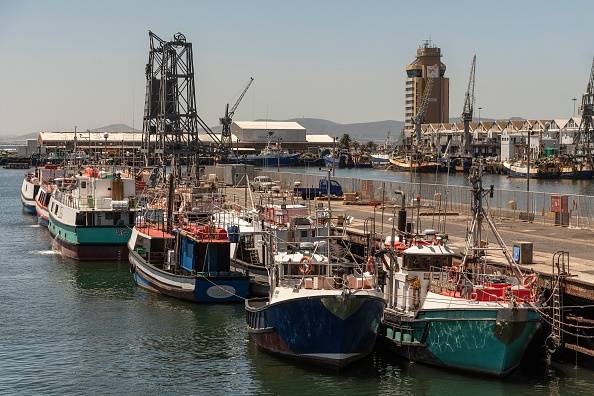
Boats lined up at Cape Town's fishing port. (Photo by Peter Titmuss/UCG/Universal Images Group, Getty Images)
About a dozen companies are suing Forestry, Fisheries and Environment Minister Barbara Creasy after the commercial fishing rights appeals process concludes at the end of 2023.
In separate cases, the companies are objecting to the denial of 15-year commercial fishing rights, saying the decision was illegal and the application was scored incorrectly.
The 2021 Fishing Rights Allocation Process (FRAP) closed on February 28, 2022. The department received a total of 2,473 applications. These companies were among the 1,213 appeals received, but were unsuccessful.
The appeal was concluded in December 2023, with a total of 845 rights subsequently granted.
Fishermen have long been dissatisfied with the outcome of the fishing rights process.
In July 2022, GroundUp reported on the appeals process and that some fishermen had called for the process to be abolished.
Lawyers Dewald Smit and Shaheen Moula are representing about 10 of the applicants in separate cases against the minister. The applicants are challenging the minister's denial of rights in a variety of areas, including tuna and hake longline. Many of them are previous rights holders.
In one application by Greenfish Traders, a seafood company that exports to Europe and the United States, the minister said he had failed to respond appropriately to the complaint and had incorrectly scored the company.
Paper quota holders are quota holders who lend their quota to fishing companies.
Greenfish's court documents allege that despite its success, paper quota holders with no knowledge of ships, factories or tuna pole-and-line fishing are now able to “actually catch, process and sell tuna” to companies like Greenfish. concerns have been raised about the sale of permits to
In a separate application, Mossel Bay Indigenous fishermen who applied for hake longlines said it took the minister 16 months to decide on their appeal.
The company said it was “forced to barely survive for almost two years while the Minister and his department took the illegal decision to deny fishing rights.”
The company said that even though the fishing rights ended in December 2020, “due to departmental incompetence and simply inadequate planning, the fishing rights allocation process to ensure the uninterrupted continuation of commercial fishing was poorly planned.” “It was not done,” he claims.
Prairie Pride Trading Co., whose hake longline application was rejected, said all hake longline appeal decisions had the same date. The company's application to the court said it was “humanly impossible” for a minister to read, use his brain and make decisions on 280 fairy-tale longline complaints in a single day.
Moolla told GroundUp that the FRAP process was “hastily and haphazardly allocated” and that the online process also had serious flaws.
Ministry spokesperson Peter Mbelengwa said: “FRAP's appeals process was fair, impartial and transparent and resulted in the right outcome.”
The Department and the Minister “received positive feedback on the outcome of the appeal process”. He said the 12 cases represent only 0.48% of the total number of applications.
Mr Mbelengwa said the ministry would defend the decision made during the appeal process. He added that the ministry could not answer some of GroundUp's questions because they related to “ongoing legal proceedings.”
Some of the issues are scheduled to be heard in the Western Cape High Court in May.
This article was first published by GroundUp.

